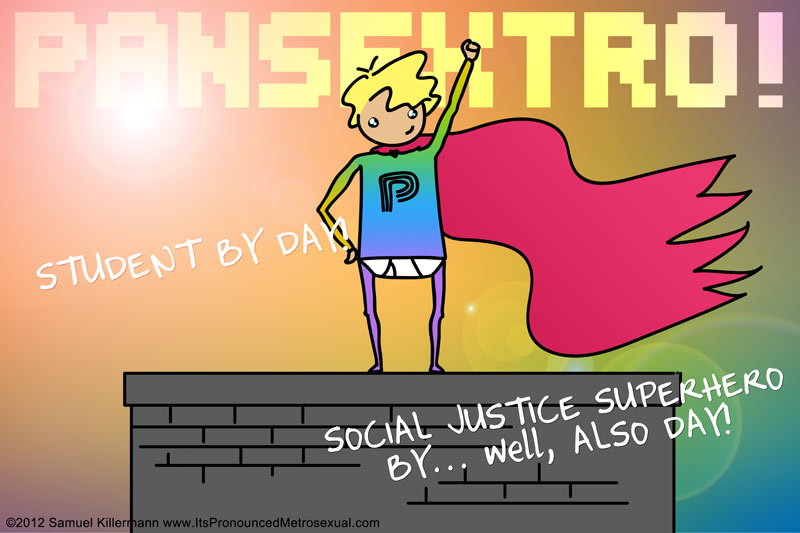Bisexuality is a thing. It’s not just “a stop between gay and straight.” But how do you explain that to someone who just. simply. won’t. believe. you.
I am going to focus on the struggle many bisexual and pansexual folks have convincing their straight (or gay/lesbian) peers that bisexuality is an identity, not just a stopping point between two others. While I’m focusing this article on advice for bi- and pansexual folks, some of it applies to all sexuality discussions.
I have three main approaches you can take below, but I’d love to hear suggestions for more ways to breach this subject in the comments below.
1. Point out that not only does bisexuality and pansexuality exist, but everyone you know is probably at least a little bi-, whether they’ll admit/realize it or not.
You can point this out to them a number of ways.
Alfred Kinsey’s research on sexuality is one way, as it demonstrates quantitatively that most folks are not absolutely heterosexual or homosexual, but somewhere in between, but not the way I’d recommend (other research shows people tend to get even more holed up in their beliefs when challenged with research, so you might be affecting more regress than progress).
Another way you can demonstrate your peers bisexuality is more fun, but can be considered “jilting” and might push folks a bit too far outside their comfort zones if not done well, so proceed with care and ask for help. Sexuality is commonly broken into three spheres: physical, emotional, and romantic. Odds are they have experienced attraction to members of the same sex in one of those spheres.
Show the young men pictures of two shirtless men, one “hottie” and one “nottie” (ditto the young women, but maybe non-shirtless) and have them decide which person is more attractive. Ask them if they ever get joy/pleasure from touching members of the same sex (i.e., hugs, high-fives, handshakes, not handjobs). Ask them who they have the closest emotional relationships to, or who they enjoy spending quality time with.
Ultimately, the idea here is to help your peers realize that sexuality (aka “attraction”) is about much more than just doin’ it, and they’ve likely experienced that attraction, in some way, to members of their sex (or, if they are queer, members of the sex/gender to which they aren’t “attracted”). With this realization, and with some hope, folks will start to get a better picture of the complexities of sexuality and attraction, and realize that just because they can’t understand something (e.g., bi-/pansexuality) it doesn’t mean they can’t respect it.
2. Talk about what bisexuality and pansexuality mean to you.
Yes, this likely requires you to come out to your peers; no, I’m not telling you you need to do this. This is something you should do only when you’re ready, because even if you’ve come out to a number of social circles in your life, coming out to your class might be tantamount to coming out to your entire school, which, if Glee has taught me anything, isn’t much easier now than it was when I was in high school.
However, people tend to relate to individual stories, particularly if those stories belong to people they already know and trust. Sharing a class or workplace or mutual friendship with someone, particularly if it has a history of discussion of sensitive issues, fosters at least a small amount of trust.
Explain your experience with your own bi- or pansexuality. What does attraction mean to you? How do you reconcile in yourself what seems to many to be an impossible concept? Talk about your first realizations of your sexuality, and how you came to make sense of it yourself. All of this and more will help someone understand a journey they will not likely ever experience themselves. (note: all these steps can be applied — though not as effectively — second-hand if you aren’t bi- or pan- yourself, but have a close friend who is)
3. Don’t do anything at all.
Just because you’re pansexual doesn’t mean you have to be PANSEXTRO: STUDENT BY DAY, SOCIAL JUSTICE SUPER HERO BY… well, ALSO DAY! What I mean to say, Pansextro, is that you shouldn’t feel individually and personally responsible for educating everyone you encounter about queer issues ‘cuz you happen to have been born into that group. Living with that responsibility on your shoulders is a heavy way to live, so, please, take my permission to not.


